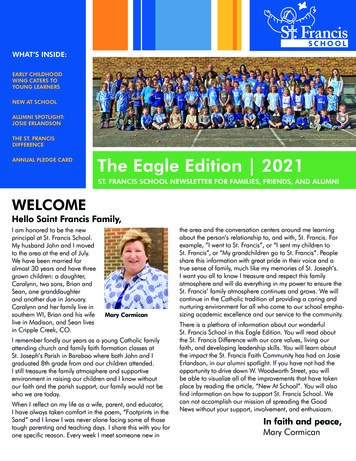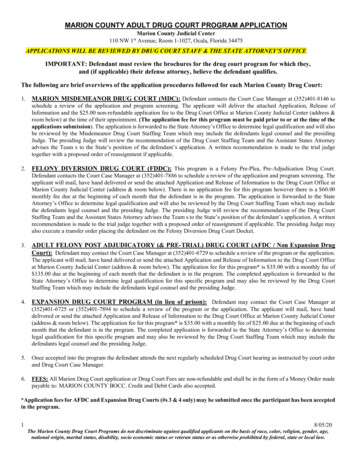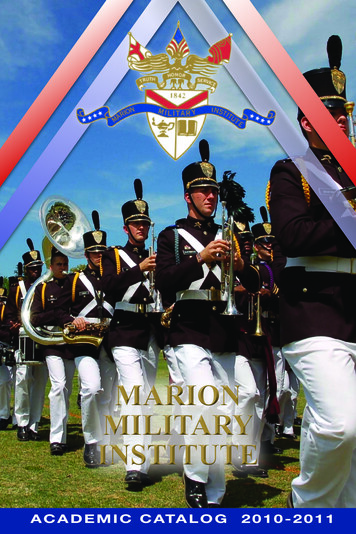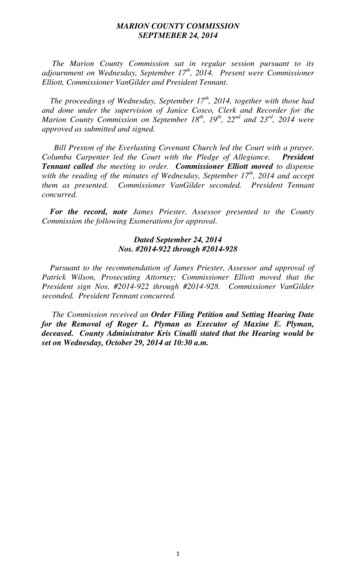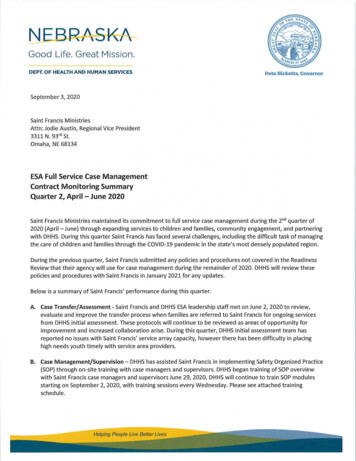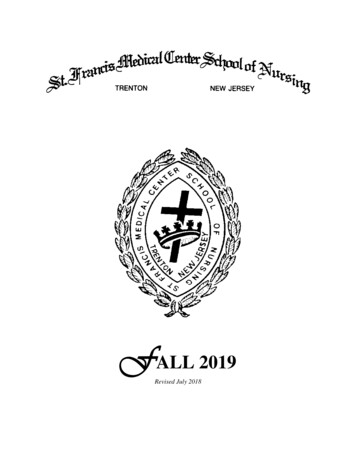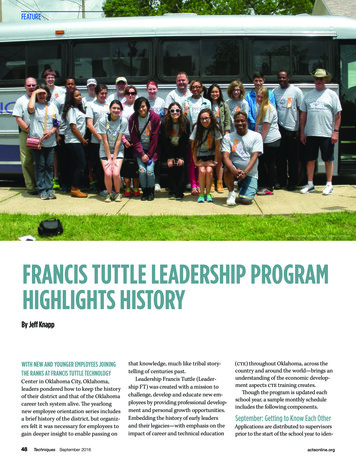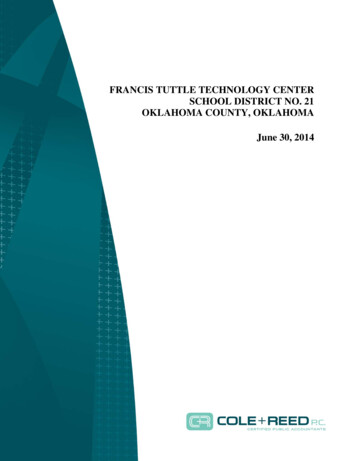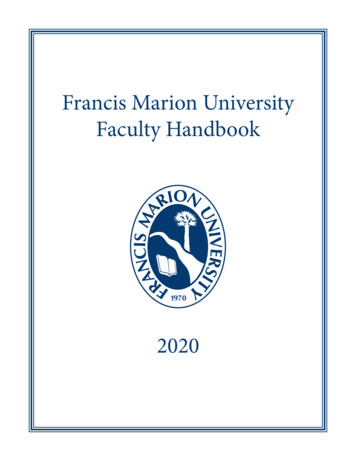
Transcription
Francis Marion UniversityFaculty Handbook2020
Francis MarionUniversityFaculty Handbook2020For the latest updates to the handbook, see FacultyGovernance home page:http://www.fmarion.edu/facultygovernance/
FRANCIS MARION UNIVERSITY FACULTY HANDBOOKTABLE OF CONTENTSADMINISTRATIVE ORGANIZATIONPresident’s Senior StaffSelection, Evaluation, and Retention of Academic Administrators111FACULTY ORGANIZATIONAcademic DivisionsFaculty Administrative StaffMembership of the FacultyVoting Faculty MembersGraduate School Faculty222233TERMS OF EMPLOYMENTContractsTeaching Assignments and LoadsPart-Time FacultyPay Periods, Checks, and DeductionsSummer Sessions (for regular on – campus courses)Sponsored ResearchDual EmploymentIntellectual Property PolicyRequired Courses: Policy and ProceduresProfessor Emeritus/Emerita Status44445555678FACULTY REGULATIONS AND POLICIESPolicies Concerning Recruitment of FacultyRecruiting and Selecting FacultyEqual Employment Opportunity and Affirmative Action PrinciplesNepotism PolicyFaculty Performance Review SystemPreambleSystem GuidelinesStudent Evaluations of FacultyClassroom ObservationAnnual Performance RatingNotice of Reappointment or Nonrenewal of Appointment ofNontenured Faculty MembersAnnual Goals (Portfolio)Appeals ProcessThird -Year Peer ReviewGuidelines for the Evaluation of Library FacultyPolicy and Procedure on TenureCriteria and Procedures for Promotion in Academic RankPolicy and Procedures for Post-Tenure Review of FacultyPolicy and Procedures Concerning Academic Freedom and Tenure1010101011111111121414ii151517171820232629
Procedures for Faculty Cases not Covered by the Policy on AcademicFreedom and TenurePolicies Concerning Teaching and AdvisingPolicy on Teaching ResponsibilityMeeting ClassesClass Attendance PolicyEmergency Notification ProceduresExamination and Grading SystemGrade Appeals PolicyFaculty Role in Cases of Alleged Academic Dishonesty Involving StudentsCopyright RegulationsPolicies Concerning Scholarly ActivityIntegrity in Research and ScholarshipProfessional DevelopmentGrant ApplicationSexual Harassment Policy and ProceduresSubstance Abuse Compliance PolicyPolicy and Procedures for the Evaluation of Academic AdministratorsOther Faculty Regulations and PoliciesConfidentialityEmployee Assistance Program PolicyFirearmsFund Raising, Sales, and SolicitationsReceiving of GiftsBook buyers on CampusOfficial Academic FunctionsOutside EmploymentPolitical ActivitySmoking PolicyTravel RegulationsPolicy 15151525252525353LEAVE POLICIESGeneral PoliciesSick LeaveFamily and Medical Leave ActWorkers’ CompensationDeath in Immediate FamilyCourt LeaveMilitary LeaveReassigned TimeSabbatical LeaveAnnual Leave (for Personnel Employed on a Twelve-Month Basis Only)Leave of Absence (Without Pay)Leave Transfer CE BENEFITS66OTHER FINANCIAL SERVICES FOR FACULTYAnnuities6767iii
Bookstore DiscountCheck CashingEmployee Fee Advance ProgramPayroll DeductionsState Employees AssociationTuition (General University Fees) Assistance Policy686868686969STATE RETIREMENT PLANS70FACILITIES AND SERVICESAthletic and Cultural EventsE-Mail Usage and Privacy IssuesEquipment and Supplies, State-OwnedEquipment and Tools, Personally OwnedFacilities, Faculty Use ofFMU CardHuman Resource RecordsKeys, Loss or Replacement ofLost and FoundParking and Traffic Regulations7777777777787878787879SUMMARY OF FRANCIS MARION UNIVERSITY’S OBLIGATIONSUNDER THE LAWAnti-Discrimination and Affirmative-ActionFamily and Medical Leave Act (FMLA)Freedom of Information Act (FOIA)Motor Vehicle RequirementsOccupational Safety and Health Administration (OSHA) Guidelines808081818282APPENDICESAppendix 1.Appendix 2.Appendix 3.Appendix 4.Appendix 5.Appendix 6.Appendix 7.Appendix 8.Appendix 9.Constitution of the FacultyBylaws of the Faculty SenateBylaws of the Francis Marion College of Liberal ArtsBylaws of the School of BusinessBylaws of the School of EducationBylaws of the School of Health SciencesBylaws of the LibraryBylaws of the Board of TrusteesStudent Rating FormINDEX838394106108111116119120130132iv
FRANCIS MARION UNIVERSITYBOARD OF TRUSTEESPRESIDENTLuther F. CarterDIRECTOROF ATHLETICSMurray HartzlerCAMPUS POLICEVICE PRESIDENTSECONOMICDEVELOPMENTFOUNDATIONPROVOSTDr. Peter KingALUMNI AFFAIRSINTERCOLLEGIATEATHLETICSCOLLEGE OFLIBERAL ARTSCAMPUSRECREATIONALSERVICESSCHOOL OFBUSINESSSCHOOL OFEDUCATIONSCHOOL OFHEALTH SCIENCESVP - ADMINISTRATION& PLANNINGCharlene WagesVP - UNIVERSITYCOMMUNICATIONSTucker MitchellVP - ENROLLMENTMANAGEMENTAlissa WartersVP - FINANCE &FACILITIESDarryl BridgesVP - REGIONAL& COMMUNITYPROGRAMSTeresa RameyVP - STUDENT LIFEChris KennedyHUMANRESOURCESPUBLIC ANCIALASSISTANCEFACILITIESMANAGEMENTPERFORMING ARTSCENTERRESIDENCE LIFEWEB R FOR UMPURCHASINGHEALTH ANNING,RESEARCH& ING TIONAFFIRMATIVEACTIONPRINTING SERVICESAUXILIARYSERVICES (BOOK,DINING)ARTSINTERNATIONALTITLE IXCOUNSELING &TESTINGUNIVERSITYATTORNEYSTUDENTOMBUDSMAN
An Overview of the Governance Process at FMU:The Movement of a Proposal from Initiation to ImplementationAcademicUnitsCommittees Reporting to the SenateAcademic AffairsAcademic Freedom & Tenure GrievanceAcademic SupportFaculty LifeGraduate CouncilInformation TechnologyInstitutional sk ForcesProvostAd ionProvostPresidentBoard ofTrusteesCommittees Reporting to the d hocAcademic SupportInformation TechnologyProfessional DevelopmentCommittees Reporting to the emic Freedom & Tenure GrievanceBudget Review & PlanningDistinguished Professor SelectionFaculty GrievanceInformation TechnologyOther SourcesCommittees Reporting to CommitteesAdmissions, Advising & RetentionAcademic AffairsHonors ProgramAcademic AffairsAcademic Freedom & Tenure GrievanceMediationFaculty GrievanceDistinguished Professor SelectionFaculty LifeAction CommitteesGrade Appeals (decide a case)Faculty Life (announce awards)Nominating (conduct elections)Last update: 06-05-07
FRANCIS MARION UNIVERSITY FACULTY HANDBOOKADMINISTRATIVE ORGANIZATIONPresident's Senior StaffThe President's Senior Staff is composed of administrative staff and facultyrepresentatives who work closely with him in planning operations for their areas of responsibilityand in reacting in a timely manner to issues that confront the University. The Senior Staff meetsregularly at the call of the President. Members include the President, the Provost, the VicePresident for Student Affairs, the Vice President for Administration, the Vice President forBusiness Affairs, the Vice President for Public and Community Affairs, the Vice President forDevelopment/Executive Director of the FMU Foundation, and the Chair of the Faculty.Selection, Evaluation, and Retention of Academic AdministratorsWhen a vacancy is anticipated in the position of President of the University, the faculty,through the Faculty Senate Executive Committee and/or a search committee, shall communicateto the Board of Trustees its views on filling the vacancy. When a vacancy is anticipated in theposition of Provost, the faculty, through the Faculty Senate Executive Committee and/or a searchcommittee, shall communicate to the President its views on filling the vacancy. The faculty shallelect faculty representatives to be included on any search committee.Faculty evaluation of the President, the Provost, school deans, and department chairs isconducted on an annual basis by means of an evaluation instrument developed by the faculty.(See “Policy and Procedure for Faculty Evaluation of Academic Administrators.”)Department chairs and school deans are appointed by the President following arecommendation by vote of the faculty in their respective units and a review andrecommendation by the Provost. Department chairs serve three-year terms, School deans servefour-year terms, the Provost serves a five-year term, and the President serves a six-year term(subject in the case of the President to approval by the Board of Trustees, which has the ultimateresponsibility for the renewal or termination of his/her contract). At the end of each term,administrators undergo formative evaluations by the faculty in their respective units.Administrators may be reappointed following reelection to additional terms.1
FACULTY ORGANIZATIONAcademic DivisionsThe academic units of the University consist of the Francis Marion College of LiberalArts, the School of Business, the School of Education, and the School of Health Sciences. Theacademic departments include the Departments of Biology; Chemistry; English, ModernLanguages, and Philosophy; Fine Arts; History; Mass Communication and Speech; Mathematics;Physics and Astronomy; Political Science and Geography; Psychology; and Sociology;academic sub-units within the School of Business (Business Administration, Economics, andComputer Science); academic sub-units within the School of Education (Early ChildhoodEducation, Elementary Education, Middle Level Education, and Secondary Education); academicsub-units within the School of Health Sciences (Nursing, Physician Assistant, Speech-LanguagePathology, and Healthcare Administration); and the Library. The Provost is the chief academicofficer.Faculty Administrative StaffDepartment chairs and school deans are generally responsible for the activities of theirdepartments and schools, for which they are accountable to the Provost. Their primaryresponsibility is supervising the teaching, research, and professional service of their faculty.Department chairs and school deans represent their departments and schools in relations withother departments and schools and with other administrative officers of the University. Inexercising leadership in the improvement of programs and faculty, a chair or dean is expected totake the initiative to report that unit's needs and advocate its goals and plans.A department chair's and school dean’s specific functions include the following:recommending the approval of departmental policies and procedures involving peer evaluations;recommending faculty appointment, reappointment, tenure, promotion, termination, anddismissal; interviewing prospective faculty; monitoring departmental implementation ofAffirmative Action policies and procedures; annually evaluating each member of thedepartment's faculty and staff; developing and monitoring departmental budgets; supervising thedepartment's program of instruction, including scheduling, faculty workload, and departmentalresearch and professional service; ensuring that students' rights are preserved; supervising theadvising of departmental majors and graduate and undergraduate students; monitoring studentevaluation of instruction, courses, and programs within the department; supervising summerschool programs; approving applications for professional travel and sabbatical leave; arrangingmeetings of the departmental faculty; meeting with the departmental committees; and teachingtwo to three classes each semester.Membership of the FacultyThe University faculty shall consist of the President, the Provost, the deans and otheracademic officers, including librarians, the department chairs, and all other persons who areappointed to a full-time instructional, research, public service, or administrative position with therank of professor, associate professor, assistant professor, or instructor. In addition, all persons2
appointed to an instructional position on a part-time basis with faculty rank are consideredmembers of the faculty and may attend meetings of the faculty.Voting Faculty MembersThe voting faculty shall consist of full-time tenured, probationary (i.e., tenure-track), andtemporary faculty who normally teach at least two courses that total a minimum of six credithours or nine contact hours per semester. These faculty are in coded and slotted (FTE) positionsand are eligible for state-funded benefits. Department chairs are voting members of the faculty.All full-time librarians hold academic rank and are voting members of the faculty. All facultywho had voting privileges at the time of the ratification of the 2001 Constitution shall retain themfor the duration of their continuous employment in their present position. Furthermore, all facultywho (1) had voting privileges as of April 1997, (2) have retained faculty status, and (3) at thetime of the ratification of the 2001 Constitution serve in the same position as of 1997 shall retainvoting privileges for the duration of their continuous employment in their present position.Graduate School FacultyAll full-time and part-time faculty teaching graduate courses normally hold the highestearned degree in their disciplines and must have exhibited excellence in instruction and inscholarly and professional activities. The graduate courses which they teach must be in the fieldsof their respective expertise.Membership in the graduate faculty is extended on a continuing basis to academicadministrators and to those holding the rank of full professor. Membership may also be extendedon an annual basis to faculty members at any rank who have not been designated as continuingmembers but who teach at least one course numbered 500 or above during the academic year.Credentials of both annual and continuing graduate faculty are evaluated annually by departmentchairs and school deans.3
TERMS OF EMPLOYMENTContractsAppointments generally are made for a period of nine to twelve months, with twelvemonth appointments extending through the fiscal year (July 1 through June 30) and nine-monthappointments, through the academic year (mid-August through mid-May). In the event thatemployment is or subsequently becomes for one semester, either fall or spring, the salary shall beone-half of that for the nine-month period. Contracts are issued annually by the President of theUniversity for employees reporting directly to him. Other contracts are issued annually by theProvost on recommendation of the appropriate dean or department chair. Contracts are sent induplicate, the original to be signed by the faculty member and returned to the Human ResourcesOffice. Contracts for interim periods and for summer teaching are issued at appropriate times.Teaching Assignments and LoadsThe usual teaching load at the University is twelve credit hours. Fifteen hours per weekis the maximum contact time in Schools or departments involved in laboratory, studio, orphysical education instruction. Teaching assignments will of course be affected by the numberof students in the class, the level of the course, research, and other factors. Adjustments inteaching loads may be made when the faculty member is assigned other time-consumingresponsibilities. Because the University must serve adults in the community who cannot attendregular daytime classes, faculty members frequently are expected to assume continuing educationassignments and evening assignments.Part-Time FacultyIn the normal offerings of its curriculum, Francis Marion University employs faculty on apart-time as well as a full-time basis. No distinction is made in the procedure by which full-timeand part-time faculty members are recruited, although vacancy announcements are less widelycirculated for part-time faculty. Part-time faculty must meet the same professional, experiential,and scholarly criteria as those of their full-time counterparts. Part-time faculty (like full-timefaculty) must have at least the Master's degree in field or a Master's degree with at least 18graduate hours in the teaching field to qualify for teaching, as required by the SouthernAssociation of Colleges and Schools (SACS). Part-time faculty are employed by the semesteronly, do not accrue time toward tenure or promotion, and are not eligible for certain fringebenefits.Part-time faculty are provided orientation and supervised by their respective deans ordepartment chairs, who also have the responsibility for the evaluation of part-time faculty. As acondition of their employment, part-time faculty members agree to be available on a regularbasis to their students for purposes of academic assistance. Part-time faculty are appointed aspart-time instructors or lecturers.Part-time faculty members have the right to attend faculty meetings and enjoy theprivilege of the floor. However, they do not have the right to vote. Part-time faculty membersdo not serve on University-wide committees.4
Pay Periods, Checks, and DeductionsFaculty are paid on a semi-monthly basis with pay dates normally on the 15th day of themonth and the last day of the month. A detailed list of pay dates is published annually for ninemonth teaching faculty. Nine-month faculty are given the option of being paid in 18 payments or24 payments. Checks are usually delivered to designated campus locations for pick-up ordeposited in individual bank accounts upon request. Checks are not released to anyone exceptthe employee unless prior arrangements have been made with Payroll. Unclaimed checks arereturned to Payroll. Social Security, federal and state income taxes, state retirement,hospitalization, annuities, and other insurance plans are handled on a payroll deduction basis.Summer Sessions (for regular on-campus courses)The University offers three summer sessions: Late Spring, Summer School I, andSummer School II. Summer teaching appointments are not included in the regular academic yearcontract. Summer pay rates are subject to change. The Provost will provide to the faculty aschedule of upcoming summer school pay rates no later than January 15. The maximum whichcan be earned during the summer for teaching regular on-campus courses is 40 percent of theprevious academic year's salary. Summer appointments are not always assured, nor are facultymembers required to teach in the summer. Compensation for teaching, sponsored research,and/or other activities performed during the summer months (between academic years), and notrelated to a regular summer session for an employee whose base period is a semester or academicyear, shall be at the same rate as for his or her base period for the immediately precedingacademic year.Sponsored ResearchSponsored research during a faculty member's base period will be considered ascompensated for in the faculty member's base pay. Additional or extra compensation for suchwork will be allowed only when approved through the Dual Employment process.Dual EmploymentPermanent State employees may accept additional temporary/part-time employment withState agencies provided that prior to performing these services, appropriate dual-employmentforms have been completed and approved. No State employee may accept any work orremuneration that could be reasonably construed as a conflict of interest. Acceptance withoutproper prior approval of a work assignment or remuneration that is found to be a conflict ofinterest will be grounds for disciplinary action or termination of employment.No employee can receive additional compensation for services performed duringscheduled hours of work (including mealtimes and breaks) unless the employee takes annualleave or leave without pay. An employee's work schedule shall not be altered or revised in orderto provide time to perform dual-employment duties. However, an employee, employed on atwelve-month basis only, may use annual leave while providing services during working hoursfor a requesting agency and may receive compensation from that agency for services performedduring the period of leave. However, no employee shall receive any additional compensation5
from the primary employing agency while in a leave-with-pay status, to include all designatedpaid State holidays and compensatory leave.The maximum compensation that an employee will be authorized to receive for dualemployment shall not exceed 30 percent of the employee's annualized salary for the fiscal year.The rate of compensation for summer employment for those employees whose base period foremployment is less than twelve months is covered under Summer Compensation and is notconsidered dual employment.If duties to be performed constitute service by the employee on a board, commission, orcommittee for which per diem allowance is to be awarded, the employee is not eligible to receivesuch per diem allowance.Travel and subsistence paid to a State employee by the requesting agency shall be incompliance with provisions in the Policies and Procedures Guide for Faculty and Staff.The maximum compensation which can be earned during the summer months forteaching regular and contract courses is 40 percent of the previous academic year’s salary.A member of the University faculty may be permitted to do professional work of anexpert character outside the University and to receive pay therefrom when the work in questioncontributes to the professional development of the individual. Outside employment shall beundertaken on the prior approval of the chair or dean concerned and prior authorization of theProvost. The University reserves the right to declare a conflict of interest at any time. Forfurther information see the Outside Employment Policies.No member of the teaching staff shall receive compensation for tutoring students in anycourse for which the faculty member is empowered to grant the student credit or over which themember has any authority. This regulation shall not be interpreted as prohibiting tutoring forremuneration in subjects over which the tutor has no control.Employment by other State agencies or departments of the University occurring during anemployee's base period and for which there is compensation in excess of the employee's regularsalary for temporary, part-time contractual, or consultative service or for honoraria is considereddual employment and must be approved in advance following the dual-employment guidelines.See the Dual Employment Policy for further information on dual employment.Intellectual Property PolicyFrancis Marion University supports the development, production, and dissemination ofIntellectual Property, including copyrights, patents, trademarks, and any intellectual creation byits faculty, staff, and, if significantly involved in the creation of Intellectual Property, its enrolledstudents. Furthermore, the University seeks to encourage and reward creativity and innovationwhile still retaining for the University, when appropriate, reasonable access to, and use of, theIntellectual Property for whose creation the University has provided assistance.Francis Marion University, faculty, and staff acknowledge that the mutual obligations oftrust, good will, equity, and fair dealing are indispensable foundations and the guiding principlesof this policy.The creator/inventor of Intellectual Property must play the active role in any process tolicense and protect Intellectual Property. The creator/inventor assumes the responsibility ofcomplying with all processes involved with the licensing and protection of Intellectual Propertyconsistent with State and Federal laws, State and Federal conflict of interest regulations, as well6
as University policy. Nothing set forth in this policy shifts this obligation from the facultymember, staff member, or student to the University.It is the intent of the University that each faculty member, staff member, or student shallbe the copyright owner of works created by the individual and at the individual’s own initiativefor academic purposes. These works would include, but not be limited to, scholarly works, classnotes, class syllabi, books, articles, literary compositions of any discipline, artistic works,scientific works, dance, sculpture, visual arts, audiovisual works including any interactive oreducational programs, sound recordings, as well as courseware development for distanceeducation programs. Revenue derived from Intellectual Property owned by individuals belongsto the individuals.Clarification of ownership and/or rights to Intellectual Property may be necessary. TheUniversity, faculty, staff, and/or students may enter into a memorandum of agreement regardingIntellectual Property rights at any time. If the Intellectual Property is commissioned by theUniversity or one of its components pursuant to a signed contract or is created as a specificrequirement of employment or as an assigned duty by the University, the Intellectual Property isowned by the University unless prior agreement has been made otherwise. Revenue derived fromIntellectual Property owned by the University is credited to the University’s general funds.Intellectual Property that results from substantial use of University resources or facilitiesmay create a joint ownership of the Intellectual Property between the University and theindividuals who contribute to the creation of the Intellectual Property. The University and theindividuals may agree to such an arrangement in writing.Any disagreements, conflicts, and/or special requests for development of IntellectualProperty shall be submitted to the Provost for further action as may be deemed necessary.The Faculty Life Committee shall have general oversight of Intellectual Property issues.At the request of the Provost, the Committee shall review any matters relating to disagreements,conflicts, and/or special requests for development of Intellectual Property. The Committee shallmake determinations and recommendations to be transmitted to the Provost. Further, theCommittee shall review on a regular and ongoing basis University policy as to IntellectualProperty. Any recommendations and/or concerns shall be transmitted to the Provost of theUniversity.The mutual obligations of trust, good will, equity, and fair dealing create the opportunityfor an early and amicable resolution of any matters relating to Intellectual Property. If a mutuallyacceptable resolution cannot be obtained, the Provost shall advise the University President. ThePresident shall make the final determination.Required Courses: Policy and ProceduresWhen it is deemed necessary and appropriate, Francis Marion University permanentfaculty and staff may be required to take certain job-related courses. When such a requirement ismade, the employee will not be responsible for any costs associated with the course(s), whichwill be borne by the University. The employee will be responsible for any program applicationfees. The employee being required to take a course completes the application form available fromHuman Resources and obtains the necessary approvals. See the Required Course Policy forfurther information.7
I.PolicyA. Francis Marion University permanent faculty and staff, regardless of race, color, religion,national origin, gender, sexual orientation, age, disability, marital status, or veteran status,may be required to take credit-hour courses each semester at no cost to the employee.Under this policy the employee will not be responsible for any costs associated withbooks or supplies. All of these costs will be the responsibility of the University;however, once the course has ended, the textbook material must be returned to themanager of the Patriot Bookstore or the buy-back cost of the textbook will be theresponsibility of the employee.B. Eligibility1. Faculty must be employed in a slotted position and must have been admitted to FMUthrough the appropriate admissions process.2. Staff must be employed for at least 30 hours per week in a permanent slotted positionand must have been admitted to FMU through the appropriate admissions process.C. Program Provisions1. Employees must pay all application fees, graduate or undergraduate.2. Employees who drop a course prior to the end of the semester must pay for the nextcourse for which they enroll unless there were extenuating circumstances for droppingthe course (i.e., death in the family, serious illness of employee, etc.).3. Employees who terminate employment prior to the end of the semester must pay forthe entire cost of the course or drop the course prior to the final paycheck beingreleased.4. Employees must pass the course which is required or pay for the next course forwhich the employee enrolls.5. Employees must use other available educational or scholarship funds prior toapplying for a required course.II.ProceduresAn employee of the University may enroll in any course offered by the University uponsecuring the approval of (1) his or her immediate supervisor, (2) the department chair of thedepartment offering the course, and (3) the Provost.Professor Emeritus/Emerita StatusWith a minimum of twelve years of full-time faculty service, assistant professors,associate professors, or professors are eligible to be considered for conferral of the title ofemeritus/emerita. Candidates will be identified by department chairs or deans, whereupon theirnames will be forwarded to the Chair of the Faculty, presented for approval by simple majorityvote at a meeting of the General Faculty, and submitted for concurrence to the President of theUniversity. These criteria are retroactive; faculty having already retired are eligible foremeritus/emerita status provided they meet the criteria listed above. Any exceptions to the abovepolicy can be approved only upon a majority vote of the faculty. Nominees for emeritus/emerita8
status proposed from the floor at General Faculty meetings shall be voted on by secret ballot.Emeritus/emerita conferees will (1) be presented with a citation at the appropriatecommencement exercises, recognizing their service to the University; (2) retain use of o
Motor Vehicle Requirements 82 Occupational Safety and Health Administration (OSHA) Guidelines 82 APPENDICES 83 Appendix 1. Constitution of the Faculty 83 Appendix 2. Bylaws of the Faculty Senate 94 Appendix 3. Bylaws of the Francis Marion College of Liberal Arts 106 Appendix 4. Bylaws of the School of Business 108 Appendix 5.

